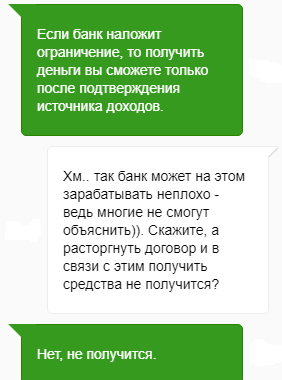Answer the question
In order to leave comments, you need to log in
Freelancers, where to keep money?
The situation is this. As you know, the self-employed, including freelancers, are pretty sad in terms of evidence of sources of funds. Banks now have the right to demand proof that the money you deposit with them is obtained in an honest way (and not for providing services to terrorists), and it is quite difficult for a freelancer to prove this. So the question arises, where to keep the money?
I asked the employees of one bank what would happen if I could not prove the sources of funds, and received a rather interesting answer, we are looking at a piece of the screen. 
That is, it turns out that if you do not provide evidence, then the money is gone. ??
Answer the question
In order to leave comments, you need to log in
It is best to receive money from customers in the EU and keep money in your personal bank account in the EU and with a credit or debit card linked to this account. Find a bank that sends credit cards to customers via DHL to the home address you specify. Almost everyone has online banking. The account is opened upon personal presence at the branch. The branch may be in your country of residence, or it may not be, then you will have to visit one of the EU countries. The law does not prohibit opening accounts in foreign banks.
Dismantling with the tax in this case is your responsibility.
As for these banks, it doesn't matter to them where you are a resident, as long as you pay them for the service and the money goes through your account. You can immediately tell them that you are a freelancer and you need an account to work with customers. Also promise to open a savings account in 3-4 months and save money from them, this will be a plus when the bank decides to open an account.
Open an individual entrepreneur with USP / PSN taxation and forget all these problems.
Just the IP is now at the central bank and raises a bunch of questions and block them just like that. There are a number of rules to look normal from the point of view of the bank: a personal account and a current account of an individual entrepreneur must be in different banks; require counterparties to specify specifically under which contract the payment is being made in the purpose of payment - such as "Advance payment under the contract number such and such for such and such from such and such date" thus the purpose of payment will be unique in each case; if your activity is wider than the set of your OKVED codes, add them to the tax office and notify the bank about it; pay taxes only from the current account; get a business card associated with a current account; if there are temporary and size limits for transfers, do not go beyond them - if the money owes a day at the request of the bank, two lie down, let them lie; in the case of transfers from abroad in foreign currency, you must have an agreement registered in advance with the site from which money is sent from the currency inspector. Now the assessment of proceeds for compliance with Law 115 (laundering and sponsoring terrorists) is handled by pseudo-AI, into which all the rules of the bank are stupidly loaded. If two violations are found in a row, he blocks the account, it is very, very difficult to unblock it. There is currently no unlock procedure as such. The only way is to strictly observe all the rules in advance. Or use cash. If two violations are found in a row, he blocks the account, it is very, very difficult to unblock it. There is currently no unlock procedure as such. The only way is to strictly observe all the rules in advance. Or use cash. If two violations are found in a row, he blocks the account, it is very, very difficult to unblock it. There is currently no unlock procedure as such. The only way is to strictly observe all the rules in advance. Or use cash.
Dima Potapenko also intelligibly chewed WHERE.
three-liter. glass. banks.
So the question arises, where to keep the money?
Something tells me that in order for them to start blocking, they need quite large amounts, or regular payments from abroad.
I don't know how relevant the problem with small translations is. You can specify the purpose of the transfer for safety net. Or welcome to the world of altcoins)
Cryptocurrencies based on the CryptoNight algorithm allow you to hide at the protocol level the wallets of senders, wallets of recipients, and amounts of funds. For example, the cryptocurrency Monero , Fonero (a renegade from Monero, or rather even from Masari) , well, etc., etc.
Part of the funds can be stored in cryptocurrencies, for example, 10% of the earnings. The other part can be stored by buying something that does not deteriorate and becomes more expensive over time, the rest on any electronic money services that allow you to receive gift virtual cards that can be linked on your phone to programs that allow you to make contactless payments using, for example, NFC technology.
And better, declare and pay taxes, then you will sleep peacefully ;-)
Today, there is nothing more reliable than storing money in cryptocurrencies. Observing all security measures.
What is the problem of confirming the source of money? Conclude formal contracts, take details of clients. and don't keep money in one bank :)
Then everything will be fine.
Didn't find what you were looking for?
Ask your questionAsk a Question
731 491 924 answers to any question